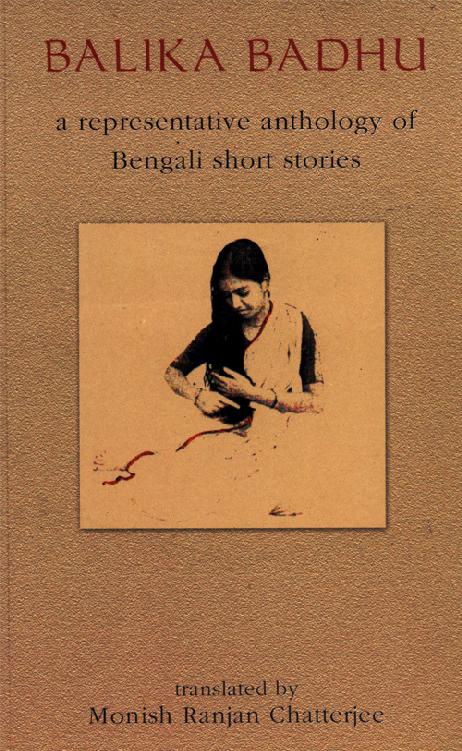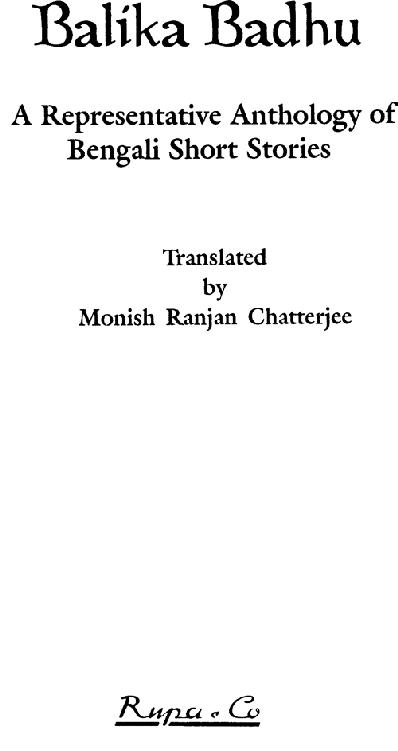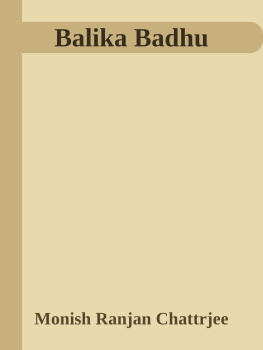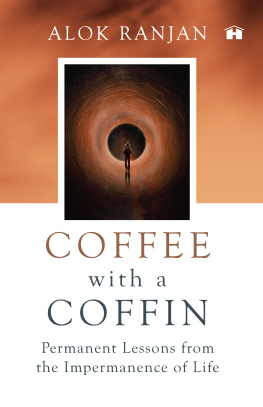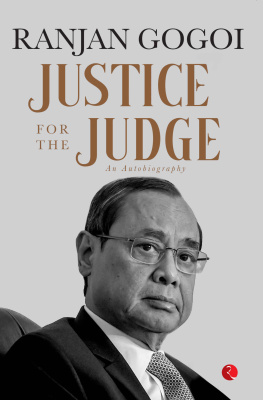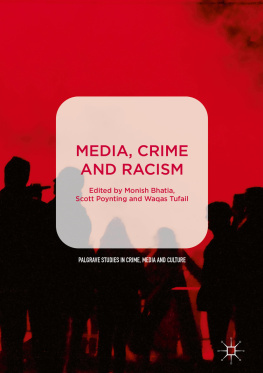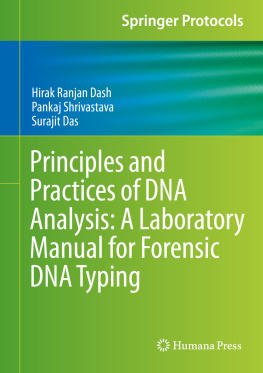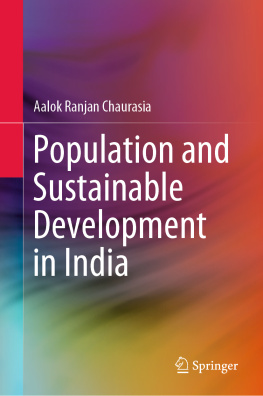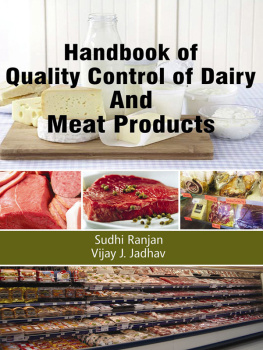Balika Badhu
Copyright Monish Ranjan Chatterjee 2002
First in Rupa Paperback 2002
Fifth Impression 2011
Published by
RupaPublications India Pvt. Ltd.
7/16, Ansari Road, Daryaganj,
New Delhi 110 002
Sales Centres:
Allahabad Bengaluru Chennai
Hyderabad Jaipur Kathmandu
Kolkata Mumbai
All rights reserved.
No part of this publication may be reproduced, stored in a retrieval system, or transmitted, in any form or by any means, electronic, mechanical, photocopying, recording or otherwise, without the prior permission of the publishers.
Typeset by
Mindways Design
1410 Chiranjiv Tower
43 Nehru Place
New Delhi 110 019
Printed in India by
Saurabh Printers Pvt. Ltd.
A-16 Sector-IV
Noida 201 301
In loving and respectful memory of:
Anima Mukherjee (Phoolpishin)
tobu mone rekho
Shibapriya Mukherjee (Phoolpishemashai)
passionately Bengali
Apurbanath Banerjee (Mejopishemashai)
a bygone age of action and service
Pijush Kanti Sarkar (Pijush-da)
the quest to find the voice
Haradhan Chakroborty (Mamadadu)
simplicity, the noblest human virtue
And for:
Adrian Korpel
scientist, scholar and renaissance man par excellence
Mamata Mukherjee (Didi)
compassion true to her name
Sharmila Chatterjee (Boudi)
a vibrant specimen of feminine energy
Nilima Bhattacharjee (Pishimani)
ami kyamono koriya janabo amar juralo hriday
Contents
Translator's Preface
This project, which began with the desire to render into English a rather long tale by Bimal Kar about five years ago, eventually grew into a considerably more extended compilation of Bengali short stories by ten of the most well-known practitioners of that art since the heyday of Rabindranath Tagore. The collection is limited in many ways, not the least of which being that no woman writer has been included, and that it contains only a baker's dozen stories (if we count Bonophool's micro-stories collectively as one)a number pitifully small considering the vast and prolific field of authors and stories a translator has at his or her disposal. I have attempted to explain my rationale for my intent and selections in the introductory essay.
Since beginning this project, I have sustained a number of personal losses, and what makes the completion of it particularly poignant for me is that the individuals who have left my world were almost unanimously supportive of my feeble efforts at upholding Bengal's contributions to the literary and cultural heritage of the world. My work continues, and my only solace is that I had come to know these kind people with extraordinary wisdom and humility, and that they had extended to me a generosity and affection that exceeded by far my capacity to reciprocate or demonstrate my worthiness.
For their support and encouragement, I must sincerely thank my friend and colleague Nikolaos Bourbakis, and another friend and mentor, Arindam Purkayasthatwo individuals with unlimited optimism and uncommon goodness of heart. A special note of thanks is also due to a dear friend, Sandeep Mitra, whose enthusiastic and well-reasoned commitment to preserving and enhancing the history and culture of India is only matched by his genuine interest in all aspects of human civilization.
Finally, let me close this prologue by expressing the hope that my young son and daughter, growing up in a place separated by continents from the land of their parents' birth, may develop an active interest in the history, aspirations and achievements of India and Bengal, and attempt to bring those far-flung outposts of high civilization closer to the rest of the worlda world increasingly interconnected by commerce and communication, yet still so far apart, at times, in spirit and goodwill.
Introduction
Measured even by the standards of excellence achieved by Bengali literature in the past one hundred and fifty years, covering such diverse areas as poetry, fiction, drama, suspense, crime, belles-lettres , and historical and psychological novels, the short story as a literary genre stands apart in a class of its own. Several selected anthologies of short stories published in Bengali in the last two decades of the twentieth century emphasize two principal factors: firstly that the editors had to be virtually ruthless in limiting the collection, given the prodigious number of outstanding works in the pool from which the selections had to be made; and secondly that of all the components of Bengali literature, it is the short story which is truly and indisputably world-class. A two-volume anthology, entitled Swa-Nirbachita Shreshtha Galpa (Self-Selected Best Short Stories), edited by renowned authors Bibhutibhushan Mukhopadhyay and Samaresh Basu, and published by Model Publishing House, Calcutta, in 1987, attempted to cover one hundred years (with author's birth years in the range 1861-1960) of the short stories by bringing together a collection of, self-selected best short story contributed by each of one hundred and seventeen authors, including those widely acclaimed, as well as apparently less well-known. The anthology mentions that the selection was made with deference to the noble tradition of the Bengali short story , and to the creativity and variety represented by the collection. Another anthology, thematically compiled as the authors' first acclaimed stories (the title in Bengali was Pratham Sham Jagano Galpa), and edited by Ananda Bagchi, was published in 1989 by Pushpa Publishers, Calcutta. This anthology emphasizes the distinction between a self-selected best story collection, and a first acclaimed stories collection. While the former is picked out: by the author alone, from the compendium of his or her works, reflecting individual taste or preference, the latter is based on viewing one's own work from the perspective of the wider readership, and finding a resonance within one's own mind. While such a collection may well be regarded as being driven by popular acceptance, and therefore become subject to reservations with regards to its literary merit, the anthology goes on to claim that instant and spontaneous popularity does have a measure of lasting value.
A slightly different class of selected short stories in Bengali, developed out of a tradition of Sharadiya Special Issues (published annually during the autumn Durga Puja festival in Bengal) of Desh and other literary magazines for well over fifty years, links the development of experimental and creative writing in Bengali with the proliferation of news and literary magazines. These two components have clearly been mutually supportive, and consequently short stories published in literary magazines have, within only a few decades, been accorded the same admiration otherwise reserved for classic works published by elite publishing houses.
During the 1970s, the National Book Trust of lndia took up a plan to publish short stories written in the constitutionally recognized regional languages of India, along with their translations in the other languages. This initiative resulted in a collection entitled Ekushti Bangla Galpa (Twenty One Bengali Short Stories), edited by Arun Kumar Mukhopadhyay, Professor of Bengali Language and Literature, University of Calcutta, and published by the Trust in 1977. Professor Mukhopadhyay has provided an excellent overview of the different periods, classifications and evolution of the Bengali short story. It turns out that the present collection of English translations, even if decidedly small in number and scope, does however contain samples from each of the key periods discussed by Professor Mukhopadhyay. The introduction presented here will draw generously from Professor Mukhopadhyay's commentary.
